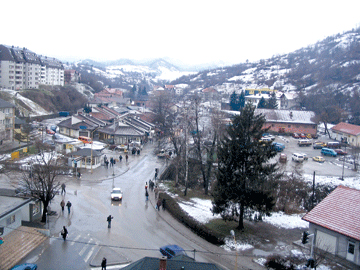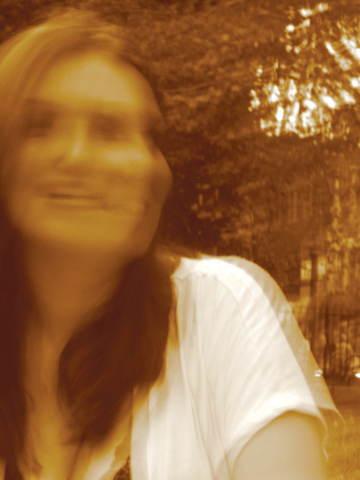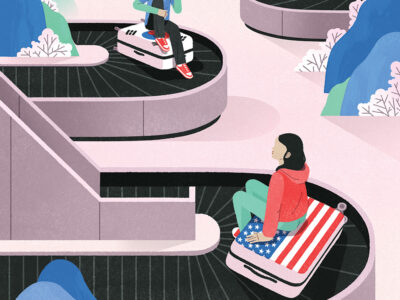
“This was not a vacation but something else entirely.”
By Ivona Boroje
We had been told that we were going to the sea for vacation. My three-year-old sister and I squealed with joy. Vacation meant a six-hour drive from Banovic´i, in central Bosnia, to Dubrovnik or Podgora on the Croatian coast. My parents would squeeze as much as possible into our yellow Fic´o—a Yugoslavian version of the Fiat 600, measuring a mere 11 feet from end to end—and stack the rest on the top. As my mom would funnel water and milk into two-liter bottles for the trip, my dad would complain about how much stuff we planned on cramming into the car. And Doris and I knew our part: gathering up our swimming trunks, tubes, and beach balls. I hoped this would be the year I’d learn to swim.
Only this time my parents did not follow our usual routine. Even to my six-year-old eyes, our preparations seemed frenzied and out of the ordinary. My parents pulled the shades down and packed in the dark. There was hushed talk about taking money out of the bank. Slowly I started to suspect that this was not vacation but something else entirely. After all, it didn’t even seem warm enough to go swimming yet. It was only May.
And we weren’t taking the Fic´o, because there would be no one to drive it. My dad wasn’t coming.
Along with two aunts and three cousins, my mother, Doris, and I boarded a bus at our town’s main station. So many people stood on the platform, waving and crying, that I cried too. I knew then, for sure, that this was not a happy occasion.
At first the monotony of the drive lulled me to sleep. Then the bus abruptly stopped. Men boarded it and ordered us to get out. We did. Sixteen years later my memory is hazy, but I believe there were no grown men among the passengers. At the command of these strangers, our suitcases soon lay open on the road. Doris and I stayed close to Mama, clutching her hand and holding on to her clothes. But nothing more happened. The men let us get back onto the bus and it drove on. Sitting among the other shaken-up women and children, I no longer held on to any pretense of joy about this trip. I was terrified.
But as I soon came to understand, staying home—as my grandparents, dad, and uncle did—was even more terrifying. The first grenades were thrown on Banovic´i the day after we left. Living with fear had started for them. Living with fear for them had started for us.
When the bus reached its destination, I discovered that the adults had not lied to me entirely. The Adriatic Sea stretched out before us—but I had never been to this town before. And as I suspected, we wouldn’t be going swimming yet. After a few days we set off on the bus once again. I did not know where we were going. The driver dropped us off at a cement block that served as a stop on the side of the highway. An immense mountain lay on one side of the road, and the sea was just visible at the bottom of a steep slope on the other side. We were three adult women, two young women, one teenage boy, and two little girls, waiting awkwardly with our bags.
After some time a friendly, balding man with a white beard pulled up, and Aunt Branka greeted him. He drove us up the mountain on a winding road and soon the sea disappeared. Dark green pines surrounded us. The road narrowed almost dangerously as a small group of houses appeared in the distance. This village, we were told, was Slime—a name Doris and I found particularly funny, since it was just one letter off from sline, the word for “snots.”

Our endpoint was a rectangular white house with three sets of windows covered by dark blinds. It quickly became clear that we were planning to stay for a while. I’d never spent very much time with my cousins, but now D‑eni and Sanja spent evenings teaching me and Doris songs, for us to perform in sibling competition. When they left us behind to accompany one of our new neighbors on trips to the beach, life became less interesting and less pleasant. Especially since it went on without my dad, who was now a soldier back in Bosnia.
Someone else must have sensed that I needed a real vacation from this pretend one, but I can’t remember who suggested that Aunt Branka, Kristijan, and I take matters into our own hands and get to the beach—even just for an afternoon—any way we could. It was probably Aunt Branka herself, who could never stand to be left out of any fun. Doris was too small, but I was proud to be considered big enough for this adventure. Determined to prove them right, I resolved not to whine, no matter what. Towels in hand, we set off in hopes of hitching a ride as far as we could go.
The problem with hitchhiking in a trio, of course, is that only a lone driver would be able to seat all of us comfortably. That didn’t dent our determination. Along the narrow road we walked, and walked, and walked, stupidly in the heat of the midday sun. Few cars passed—after all, the winding path only led to our isolated village—but surely the highway would be a different story.
By the time we got there, winning our first glance of the glistening sea, we were exhausted and dried out. Aunt Branka jutted out the hip of her curvy, 38-year-old frame, flashing her blond hair and an upturned thumb at passing cars. None stopped. We walked on. I cannot remember experiencing any relief from a swig of water; whatever we’d brought to drink would have long since turned disgustingly warm. A two-foot-wide cement buffer separated our tiny walking lane from the whizzing traffic. Heat pressed against us from every direction. At some point we reached a clearing, and then descended through a stand of pine trees that smelled of suntan lotion. A pebbly beach came into sight.
Curiously, our actual time at the beach and in the sea has become a blur in my memory now. I cannot even remember how we got back to the village. Our hours must have been pleasant, yet not as carefree as in summers past.
That summer turned into fall and then to winter. Slime became our home for four years. It never did get easier to get to the beach. A handful of times, my dad made it out of Bosnia and the fighting to come see us, and we’d go to the sea together. Those days were precious.
In 1996, we returned to Banovići. The town was a different place. My bedroom wall was now riddled with shrapnel holes. But it was still our apartment, and still our town. My old companion Jasmina, who had enrolled in school with me as a 6-year-old, right before the outbreak of war, finally became my classmate for the first time, and my best friend. Even if I had to leave school once a week during a class on Islam, which did not apply to me as the daughter of an ethnic Serb and an ethnic Croat—a truly Yugoslavian union that was already beginning to seem like an artifact from a vanished era—I had found a sense of belonging at long last. My family was excruciatingly poor, but that did not matter. I finally felt like I was home.
The feeling was not destined to last long. Not even two years after returning to Banovic´i, we left again—this time, all of us. My parents took a gamble and applied to immigrate to the United States. The visas came through. For the sake of my education and my future, I lost my friends and the sense of home I had finally found.
New friends slowly replaced the old ones, but that sense of belonging is something I have never quite regained. I have gone back to Bosnia three times. Each time, it takes Jasmina a while to warm up to me. My old acquaintances cannot understand the life I have lived—with a valuable American passport, in places they’ve only heard of—and I fail to comprehend precisely how their lives have changed through the years. As my college graduation came and went, I couldn’t help but wish that the rest of my family—my grandparents, my aunts and cousins who were so formative in my wartime childhood—had been able to come. But deep down I know how profoundly impossible such a thing has become. Life spun the two worlds apart.
I am from the diaspora now. My life is more or less typically American, my connections to Banovic´i and Bosnia inconcrete. I try not to unsettle people in either place by talking too much about the other. But still, ten years after leaving for the second and final time, I occasionally find myself spiraling off into spells of nostalgia. Sometimes I will spend hours on a website dedicated to my old hometown. Bosnian music plays in the background, the local weather forecast shows a sun or clouds, and I lose myself reading comments on the forum boards. But I always abide by one personal rule. I never post a message of my own.
Ivona Boroje C’08 graduated with a major in communication and minors in art history and English.




